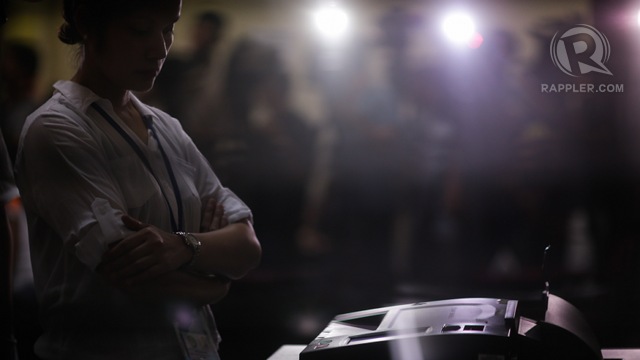SUMMARY
This is AI generated summarization, which may have errors. For context, always refer to the full article.

MANILA, Philippines – Watchdogs consider it key to poll transparency, but poll chief Sixto Brillantes Jr on Monday, April 22, said he has given up on opening the source code of ballot-counting machines for review by local groups.
“Ako naman, ayoko na. Binigyan ko na ng deadline ‘yan eh,” Brillantes told reporters in an interview on Monday. (On my part, I’m giving up. I already gave that a deadline.)
Likened to a “recipe” or “master blueprint,” the source code of precinct count optical scan (PCOS) machines was held hostage by a legal battle between two foreign companies. Due to its squabble with the Venezuelan firm Smartmatic, the US-based Dominion Voting Systems blocked the release of the PCOS source code for review by Philippine groups.
Now, less than 30 days before elections, Brillantes said it is “too late.” (Watch more in the video below.)
“Maski ibigay nila ang source code, hindi na rin mare-review. Kulang na ang oras eh,” Brillantes said. (Even if they give us the source code, we can no longer review it. We already lack time.)
Watchdogs, like the Center for People Empowerment in Governance executive director Evita Jimenez, believe a source code review should be able to show that PCOS problems in 2010 have been corrected. These problems included multiple transmissions and signal jamming, according to Jimenez in an earlier Senate hearing.
No legal implications
Brillantes, however, refuted claims that the lack of a local review will pose legal implications. A veteran election lawyer before joining the Comelec, he said the local source code review is important “for credibility purposes, not for the legality or legitimacy of the elections.”
In previous interviews, Brillantes said what is important is the source code review by an international group, “which is totally independent.”
In February, the Comelec cited a report by the Denver-based SLI Global Solutions that the Philippines’ automated election system “can operate properly, securely, and accurately.” SLI said there is no “malicious code” in the PCOS. (Read: ‘No malicious code’ in PCOS – int’l experts.)
Brillantes dared critics to prove the legal implications of lacking a source code review by local groups.
“Kung may legal implications ‘yon, dapat null and void ang eleksyon noong 2010. Wala namang nakakita ng source code eh,” Brillantes explained. (If that has legal implications, the elections in 2010 should have been null and void. No one saw the source code then.)
At the Comelec main office in Manila, however, another kind of source code review is taking place – that of the consolidated canvassing system (CCS).
In an earlier interview with reporters, Brillantes the CCS involves the transmission of election results from the PCOS. The review of the CCS source code is being conducted by the United Nationalist Alliance and Parish Pastoral Council for Responsible Voting. – Rappler.com
Add a comment
How does this make you feel?
There are no comments yet. Add your comment to start the conversation.